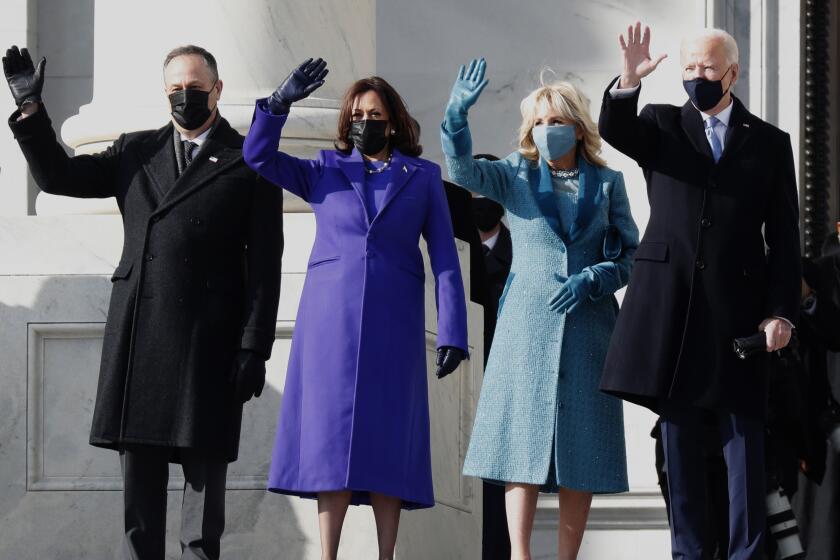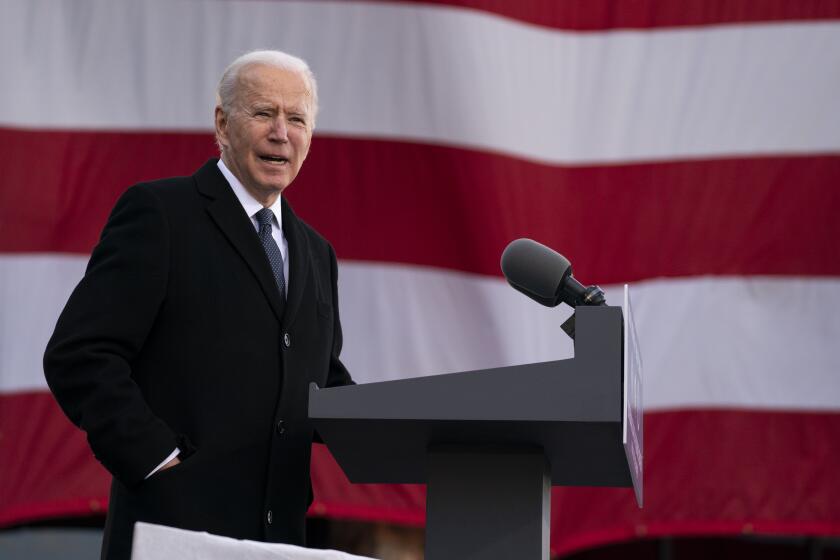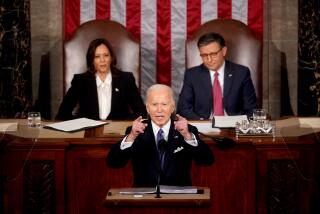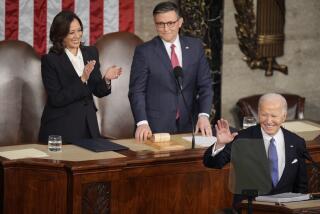Op-Ed: Joe Biden gave the speech America needed
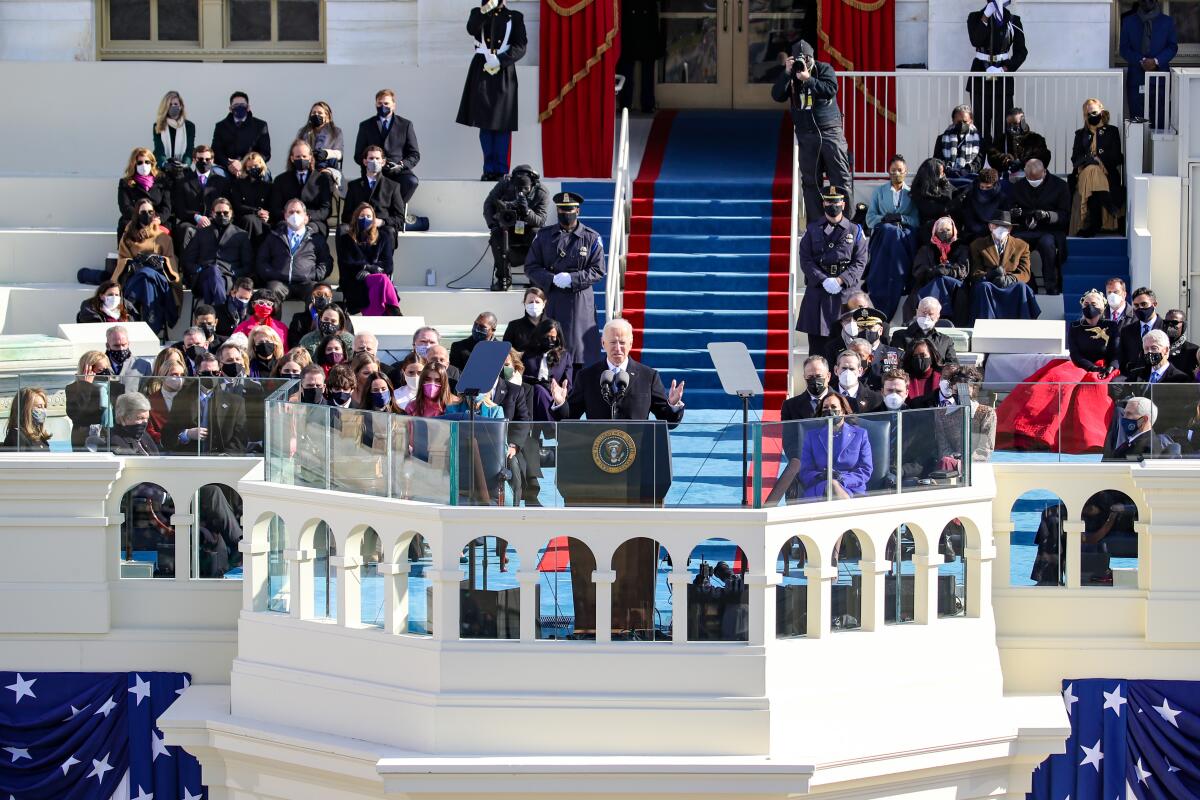
Joe Biden gave the speech we needed after the trauma of an insurrectionist attack on the Capitol building before which he stood. With plain language, it was just right for the place and moment. And it drew some sharp lines in calling on American values.
The day was deeply moving, with a beautiful sea of flags stretching across the National Mall; the sight of Kamala Harris taking the oath; and the extraordinary poem by Amanda Gorman. Each bit of it felt like a repudiation of the era we’ve just passed through.
As in many inaugural addresses, there were pledges for unity, progress and action. But never before have these ideas felt more relevant. The context transformed the speech.
All inaugural speeches engage in a dialogue with those that came before. In 1861, Lincoln put the choice before the country squarely. “In your hands, my dissatisfied fellow-countrymen, and not in mine, is the momentous issue of civil war.” Biden updated that idea: “We must end this uncivil war that pits red against blue, rural versus urban, conservative versus liberal. We can do this if we open our souls instead of hardening our hearts.” Speaking in a city ringed by a division’s worth of troops, for the first time since Lincoln’s second inaugural, he pledged to defeat “white supremacy, domestic terrorism.”
Three things stood out — rhetorical points that will set political priorities.
Joe Biden is inaugurated hours after his predecessor leaves the White House, clearing the way for a beleaguered nation to turn the page on one of the most divisive chapters in its political history.
First, Biden identified the ideal most under attack: democracy. He spoke of the mob that thought it “could use violence to silence the will of the people.” He left unsaid that the mob was sent to the Capitol by the now-former president. Biden mentioned “democracy” 11 times in 20 minutes. (Trump, in his inaugural speech, did not mention it once.) “We’ve learned again that democracy is precious. Democracy is fragile. And at this hour, my friends, democracy has prevailed,” Biden said. In another time, this would be obvious, but after the 2020 election and the attempt to overturn it, the idea is profound.
This week, Senate Democrats introduced sweeping voting reform in S. 1, joining the House voting reform bill already designated H.R. 1.
The second striking thing was Biden’s direct focus on race. As he does so often, he cited the ideals of the Declaration of Independence and described them as often at war with our reality. “I know that the forces that divide us are deep and they are real. But I also know they are not new. Our history has been a constant struggle between the American ideal that we all are created equal and the harsh, ugly reality that racism, nativism, fear, demonization have long torn us apart.”
It’s not the first time a president spoke about race in an inaugural, of course. Much of Bill Clinton’s second inaugural was principally devoted to the topic. But in the aftermath of the Black Lives Matter protests and the ongoing assault on voting rights, it is politically as well as morally important that Biden adopted that language as his own.
Biden has already spoken about the quest for racial justice as a key administration goal. The nation will have to look to action on criminal justice reform as well as voting rights to give meaning to his rhetoric.
Finally, he spoke about Trump and his movement. Well, not by name. But the point was unmistakable.
“There is a truth and there are lies, lies told for power and for profit,” he declared. “Each of us has a duty and responsibility as citizens, as Americans and especially as leaders, who have pledged to honor our Constitution and protect our nation, to defend the truth and defeat the lies.”
Of course, such lies were spewed not just by Trump or his crazed followers but also by the majority of the Republicans in Congress, including House Minority Leader Kevin McCarthy, who aggressively pushed the lie that Trump won the election.
What was missing? I wish Biden had been more specific about his initial policy goals. He will have to rally the country in clear terms on ending the COVID-19 pandemic and repairing the economy, and overcome what will no doubt be resistance from Republicans in Congress. He was so determined not to focus on Trump that he did not sharply decry the Trump administration’s failures on the pandemic or much else.
Just as President Trump moved quickly to turn back Obama-era policies, Joe Biden will do the same to Trump actions soon after taking office as president Wednesday.
Many presidents have been more willing to contrast their policies with what came before. Perhaps Biden assumed the catastrophes of Trump’s governance are obvious. No doubt he wants to peel off those Republicans who backed Trump but who perhaps have been shaken out of their trance by the insurrection. An era of better feelings may matter more than sharp goals.
Biden’s speech, for future generations, may not rank with Kennedy’s gloriously inspirational address or the somber eloquence of Franklin Delano Roosevelt’s first inaugural. But for Americans right now, it was a moment to exhale, an address that stirred faith and, yes, hope.
Michael Waldman, president of the Brennan Center for Justice at NYU Law, was director of speechwriting for President Clinton.
More to Read
A cure for the common opinion
Get thought-provoking perspectives with our weekly newsletter.
You may occasionally receive promotional content from the Los Angeles Times.
